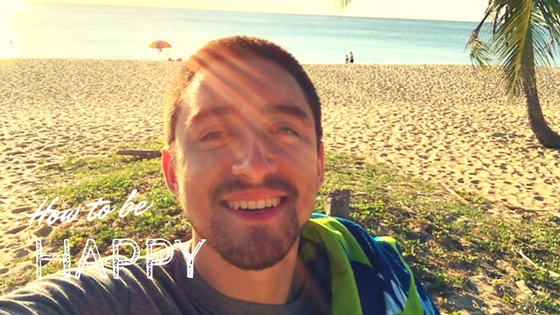There are a lot of bullshit articles online that talk about ways to be happy that mention vague techniques like, be positive! This is not one of those articles.
Im going to share some of the ways that Ive genuinely improved the amount of happiness in my life. Im a very analytical guy, so Ive given this topic a lot of thought. Im no guru, but I am beginning to gain a deeper understanding of the way my mind works, and the minds of the people around me.
There are different types of happiness that all stem from the various emotions you feel and what caused them. For example, lets say that you’re having a great time joking around with friends.
When youre with friends, you have the sense that:
- Youre not alone. Youre a part of a tribe or community.
- Youre understood and liked, satisfying the need for emotional intimacy.
- Youre doing things together and feeling emotions together, which bonds you together and increases that feeling of closeness.
The emotion of happiness that you’re feeling with friends is caused by external physical stimuli. It also hits lot of the common needs that we all have as human beings.
Whenever you think back to a great time with one or multiple friends, youre going to recall those feelings that you felt in that moment, and smile.
Youre being reminded of this great experience you had with people who know you. It also says something positive about your identity and who you are, which makes you smile.
As you go through the rest of this article, Im going to reference a few items that are consistent throughout every situation that creates an emotion. Think of these as the levers that control your overall emotional state.
These include:
- The amount you are thinking vs. in the present moment.
- The source of the emotion (thoughts vs. physical stimuli)
- The strength of the emotion.
- What your mind is focused on at that moment.
When youre with your friends and having a good time, youre not thinking much. What does that mean? Basically, you’re engaging the emotional side of your brain, not the logical side of your brain. Youre not thinking logically. The breakdown might look like 10% logical thought vs. 90% being in the present moment and feeling good emotions.
This is why, when were having a really good time, were unlikely to check our phone or want to do anything else, because it would take our mind out of that present moment and decrease, rather than increase, the emotions we are feeling.
When were bored or alone, we tend to check our phone a lot because in the past it has been the source of positive emotions, like a text message from a friend or a funny SnapChat video. Well even find ourselves robotically checking our phone out of habit, and not realize we JUST checked it a few minutes ago. The habits are that strong.
When youre physically with your friends, the main source of your positive emotions is from external stimuli. Youre making eye contact with other human beings, smiling together, listening to stories, talking, and joking.
The stronger you feel the emotions of happiness and togetherness, the more animated you will get, the more you will talk (because you feel safe), and the more you will do things to enhance the happiness of the moment, like make a fool out of yourself, because you know that youre not being judged.
When you are with your friends, your mind is simply focused on doing or saying things that increase the overall positive emotions of the moment. If youre having a really great time, you might begin to break societys conventions and do things like talk to random strangers, run down the street laughing, or dance in the middle of a train station.
Interestingly enough, we tend to behave more like little kids when were truly happy. We dont mind doing silly things like talking with funny accents or yelling in public, because we dont feel self-conscious.
The word self-conscious is quite revealing in of itself. Our thoughts are not on ourselves. We are not having logical thoughts or thoughts related to insecurity or doubt. We are 100% in the present moment and amping up the emotions of the moment.
We are also experiencing a high degree of emotions, and want to let it out. Thats why its SO hard to keep a straight face when we actually find something funny. Our body and mind has the strong desire to let out emotions when we feel them intensely.
Though the degree that you feel these emotions will vary, even if youve been depressed, most human beings have experienced happy emotions with friends, like I’ve described. Mainstream society would label this as being in a good mood.
The techniques that Im going to be mentioning are designed to improve your overall mood in your daily life. Some of them are silly, but I guarantee you that they will change your emotional state, and thats the name of the game when it comes to happinesss.
You can boil this entire article down to one sentence.
The quality of your life is directly equal to the quality of the emotions you feel on a daily, hourly, and minute-by-minute basis.
When you look back at your life last month, youll remember scattered events, but you will certainly remember how you felt, or how youve been feeling recently.
If youve been feeling good recently for an extended duration of time (4 weeks), youll feel good about your overall life. If youve been feeling anxious, angry, stressed, or sad a lot in the last 4 weeks, youre going to feel bad about your life, even if great events are occuring at work or in your personal life.
Most people in our society are conditioned to believe that what we get or what we do leads to happiness. Its true that these two can lead to a momentary mood change, but they wont be the root cause of an overall sense of happiness and wellness.
For example, you might end up getting a promotion at work and feeling great for the next two weeks. Lets say the company even sends you on a 2 week vacation.
You have a great time for the first several days. Then something happens. Maybe you lose your sunglasses, or its just way too hot to be outside, and the complaining starts. All of a sudden, youre right back in a bad emotional state and it could ruin the next day or two of your vacation.
In this article, Im talking about an overarching pattern of the emotions that you feel in your life, not those in a specific moment. Im talking about the framework or mindset that you use to deal with emotions that come up in your life and creating one that encourages happiness over all of the other emotions that you could feel.
You develop your personality around whatever emotional state you find yourself in the most. Many of us, myself included, are addicted to these emotional states because they come with a feeling of familiarity and comfort.
As we get older, we develop a reputation around these emotional states. Thats why some friends will be like Oh, thats just Brad or Thats so Veronica.
Okay, lets get into some of the tactics and techniques that Ive discovered as to how to be happier and avoid unhappiness. Some of these might seem basic. Others might seem complex. I guarantee you that each of them will change your emotional state in a positive way.
1. Listen to Happy Positive Music.
Theres a reason that movies use music to make us feel emotions. If youre listening to sad music, its only going to amplify your sadness. It might feel good to wallow in sadness, but it will not actually change your emotional state.
If youre alone and starting to feel lonely or unhappy, listen to positive upbeat music that makes you smile, that puts you in a good mood, or that makes you want to sing along and dance.
I like to strategically listen to happy music on the subway before Im going into a social gathering, so that it will pump up my mood. Ill listen to EDM music before I go to the gym to pump up my mood and get me filled with energy. Ill also listen to light positive music when I wake up, to put me in a good mood for the day.
When youre listening to the music, dont focus on the lyrics too much (logic thinking). Just focus on the overall tone of the music and let it influence your mood.
2. Use Your Body To Influence Your Mood
There are a few ways to do this. The easiest is exercise. When you move your body, youre going to affect your brain in a positive way. I feel like a champion after Ive run only 1 mile. The same goes with lifting weights. I feel like a gladiator or something. Muahah.
This also extends to other activities like yoga or dancing in your apartment. You can even just go for a walk.
I notice huge differences in my mood when I strategically work out to improve my emotions. I also notice a big difference when I exercise my vocal cords. Ill just recite affirmations, do a podcast, film a video, or talk about something and notice that it improves my mood.
Think about it. Kids are always active, yelling, and they’re running around all the time. They’re usually quite happy. This is no coincidence.
The other way that Ill influence my mood with my body is by adopting positive body language. When you have a meek, closed off posture, youre naturally going to feel uncertain, shy, and uncomfortable in the environment.
Whenever you are, if you treat that space like its your domain and you have comfortable, confident body language, you will feel more safe, at home, and happy.
Even if positive body language will only improve your mood by 5%, when you look back a week from now on your previous week, youll feel that difference which will make you even happier because your life is going well.
Finally, its super important that you have a slight smile on your face when walking through life. Most people think that you smile when youre happy, but research has shown that you will actually feel happier when you smile, even if you dont have any reason to. It also affects how others interact with you, which Ill get into next.
3. Look At Social Interactions As A Way To Amp Up Your Mood
Most people want to receive good emotions. They like hanging out with so and so, because that person is funny and makes them feel good. We dont feel a need to go out of our way to make someone else or a stranger feel good, because it takes energy on our part.
Making other people happy and open up to you, is actually quite self serving. The only reason that I go out of my way to make a stranger laugh or to befriend a random person at a social meetup group is because it makes ME feel happy.
The Dalai Lama agrees with me! Check out this quote from 10% happier, Practice of compassion is ultimately benefit to you. So I usually describe: we are selfish, but be wise selfish rather than foolish selfish.
For example, if you’re single, you can go into a cafe, look the cashier in the eyes, smile, chat a bit, laugh about some things, flirt with them, and you both walk away feeling happier.
I used to look at social situations as a way to feel connected with other human beings, talk about deep topics, discuss my problems, and gain reassurance. While I still do that with very close friends, I try not to do that with anyone else.
Instead, my breakdown looks like the following:
10% – The amount I have or encourage logical thoughts.
90% – The amount I am in the present moment engaging the emotional side of the brain.
My only focus is to increase the silliness, fun, and happiness of the moment.
For example, I was at a Meetup event a few weeks back, and rather than talking about boring things like jobs, sports teams, and work, I just tried to make the conversation get as ridiculous as possible.
We discussed strategies for taking over the world if we were a member of an alien race, and what type of spaceship would be best to navigate the stars, particularly if our home base was the moon.
I try to ask myself, what would a little kid say or do in this moment? Usually, that leads to funny memorable conversations that are better than the boring logical shit that we all talk about.
Usually, at first, Ill get a nervous chuckle. Then, when people realize that Im joking, people will start laughing, smiling, and having a good time.
Ive been in social situations where we discuss more logical topics, and almost always, people will get tired, bored, or say theyre going to head out.
Whenever Ive been in a social situation that has an emotionally stimulating conversation, people want to stay around, because theyre having a good time.
While I put in some work to create these emotions by being silly and being willing to make fun of myself, I know it will improve the overall mood and, as a result, my mood and feeling of closeness with other people.
View social situations, even if they are with random strangers, as opportunities to boost your own mood. Dont take it so seriously. Be self-amused.
Its kind of odd, but when youre focused on boosting your own mood, you the have more good vibes to give out to other people. When I have a slight smile on my face, Ive found that people are more likely to talk with me because I have positive emotions to offer them.
4. Meditate and Gain Emotional Awareness
Meditation for 10-15 minutes per day has proven to have a lot of positive results for me. The more that I gain awareness of the thoughts and emotions that I feel, the more I am able to influence them.
The goal of meditation is to concentrate your focus on the present moment and to observe:
- What youre feeling
- What thoughts come to your mind (words)
- What images and situations or scenarios come into your mind.
- How those thoughts and images alter how you feel.
Ive found that the source of my negative emotions tend to be my thoughts. Those include:
- Random thoughts I have throughout the day
- Rationalizations about situations and what they say about me.
- Beliefs I have about myself and others
- Thoughts about what Im doing or whats happening to me.
For example, I might be walking down the street and get we weird glance by someone and then Ill feel self-conscious, because I think that theres something on my face. Because I feel self-conscious, Ill then have poor body language and negative energy when I make small talk with a cashier, which makes me come off as needy. Then, because Im looking for emotional validation, that person feels like I want something from them, and it makes them less likely to enjoy the conversation. Overall, Ill then leave feeling like Im worthless or that no one would want to be my friend. Ill feel alone or pissed off or whatever.
I might say to myself, I was just trying to be nice. Why is everyone so grumpy. Humanity sucks.
If you want to increase your overall happiness, its important to cut off all negative thoughts before they form a negative thought loop, which impacts what youre feeling and how youre acting.
If someone gives me an odd look, instead of feeling self-conscious, I could smile at them and think to myself I wonder how long I can walk around with food on my my face before someone points it out. This could be a funny Youtube video.
Ill pull out my phone and see if I do have anything on my face, and when I see I dont, Ill notice features of myself that I like, think to myself damn, you looking good today. And continue on my way with a smile.
Just thinking about that now, I can laugh about how narcissistic that sounds. Maybe I was meant to asexually reproduce, like a bacteria.
When you first hear this, it might sound robotic or fake, but actually, when you change your internal mental chatter and how you respond to negativity, youll actually feel better and happier, if for no other reason than combatting the negative feelings effectively.
If you don’t believe me, just try it out a few times and observe the results. How does it impact how you’re feeling in the short and long run?
Every human has the instinctual need to push both negative and positive emotions on other people. On the one side, if were in a bad mood, we want to bitch and complain to others to get the emotion off of our chest. We don’t care whether or not that emotion is transmitted to to other person, and then they end up feeling bad.
On the other side, if were in a good mood, we want to spread that happiness and skip through the streets and make other people light up or smile with us.
Mediation allows you to calm smile at someone who tries to push negative emotions at you. You choose to not allow those emotions to be transmitted to you, and you either deflect them or allow them to return to that person whos trying to push them on you.
You can then focus on improving their mood in other ways, rather than trying to change the way theyre thinking about a particular situation or convince them to feel better.
I definitely have not mastered all of this, but Ive certainly gained more awareness about how I can influence my own emotions and those of the people around me. Many of our own emotional patterns are habitually how we respond to events in life. They are also made up of where our thoughts gravitate towards both about ourselves and situations in life.
Notice every variable that alters your emotional state. That could be thoughts, activities, or little things you do, like making your bed in the morning.
5. Track Habits That You Use To Sooth Emotions
We all will try to get happiness through quick and effective methods. I talked about being carefree and silly. Most people in our culture will gain a fast track to this emotional state with alcohol or other drugs.
I use coffee as a way to instantly improve my mood and make me more focused or talkative. We all use something to change how were feeling. It could even be sex, porn, romantic novels, or unhealthy food.
I noticed that I tend to use my phone, social media, and TV to satisfy many feelings and quite simply get through the day.
However, these activities will also cause negative feelings to emerge, whether its jealousy, the need to feel desired, a sedentary lifestyle, or the need to showcase a cool life.
Im not preaching here. Im not saying you have to change all of your habits. All Im saying is that you will be happier if you begin to identify why you engage in certain habits. What emotion are you searching for? How are you getting it?
Ive written about some of my own descriptive emotional habits here. Were all working on something.
6. So whats the trick?
You must decide that youre going to feel 7/10 or 8/10, no matter what. Its okay to have moments when youre sad about genuine events, but you have to be willing to re-commit to your goal about being happy, looking at things in a positive light, reframing your story around events, and deciding to be happy.
Many older people will quite simply say, I dont have have time to get upset about that. Life is too short.
You don’t have to be upset about every little thing. You can choose which thoughts youre going to focus on and which emotions youre going to amplify.
Someone with less money and worse looks can be happier than someone who is rich and good looking by societal standards.
It has nothing to do with outward possessions or attributes. It all comes down to how you manage your emotions.
Our mindset functions as our internal operating system. Sometimes, it feels like some people are still running Windows 95 and its 2016. You can have great hardware (like a mac computer), but a horrible buggy operating system. Im working to continually upgrade my operating system. Im not perfect. These are some of the things Ive realized.
In conclusion, the media lied. You wont obtain emotional bliss when you acquire something or some status in society. Happiness is a day-to-day mindset. Its how you choose to feel when its a lazy Sunday, you have nothing to do, and you decide to come to a coffee shop to write an article (this one) because you genuinely love writing.
I wish you much happiness in life :). Leave a comment if youd like to share your story!



